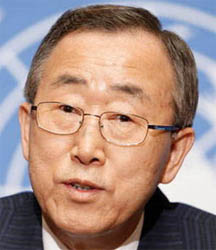While the speeches by President Obama, Iranian President Mahmoud Ahmadinejad and Israeli Prime Minister Benjamin Netanyahu drew the biggest headlines at the United Nations General Assembly in New York last week, there was a major event that went almost unnoticed: UN Secretary General Ban Ki Moon’s launch of a plan to put education at the centre of the world’s political agenda.
Ban’s initiative, called Education First, could have been by far the most important event of the General Assembly, but it’s likely to end up as the biggest missed opportunity in recent history to improve world education standards and reduce poverty. Before we get to what’s wrong with it, and how it should be fixed, let’s look at what the plan is all about.
 Ban announced the formal start of the $1.5 billion global initiative to improve education standards at a September 26 ceremony. Several countries — including Denmark, Australia, South Africa and Brazil — were appointed as “leaders” of the plan and will champion the initiative in their respective regions. In addition, several corporate foundations such as the Western Union Foundation and the MasterCard Foundation have pledged to support the project.
Ban announced the formal start of the $1.5 billion global initiative to improve education standards at a September 26 ceremony. Several countries — including Denmark, Australia, South Africa and Brazil — were appointed as “leaders” of the plan and will champion the initiative in their respective regions. In addition, several corporate foundations such as the Western Union Foundation and the MasterCard Foundation have pledged to support the project.
“It’s probably the first really high-level campaign that is being supported by the UN secretary general himself, rather than just one particular UN agency or government,” UNICEF’s global chief for education, Susan Durston, told me. “It’s the highest level of advocacy we could have hoped for.”
The idea of launching a global plan to improve education standards couldn’t be more timely.
“In our knowledge-based world, education is the single best investment countries can make towards building prosperous, healthy and equitable societies,” Ban said in his introduction of Education First.

The plan’s top priorities will be putting every child in school, improving the quality of learning, and promoting values such as peace and environmental responsibility.
Education First will “rally together a broad spectrum of actors” over the next five years to achieve that goal, Ban said. The No 1 actor must be governments, followed in descending order by donor nations, teachers, families, students, civil society, multi-lateral organizations such as UN agencies, the business community, academia, and the media.
“There is no substitute for national political leadership, policy and resources,” the Education First mission statement says, referring to the governments’ role in improving education standards.
My opinion: The problem with Education First is that it believes that governments will make it their priority to improve education standards.
They won’t, for the simple reason that political leaders think in electoral time frames — three or four years — whereas investments in teacher training and other key tasks to raise education standards pay off in fifteen or twenty years.
It wasn’t a coincidence that so few heads of state attended Education First’s launch. Unless there is a huge social pressure from the bottom to improve education standards — like we are seeing now in Chile — very few governments, no matter how well intentioned they are, will invest heavily in long-term education plans. They may invest in school buildings that can be inaugurated before the next election, but few will prioritize long-term investments in teacher training and other tasks that don’t lend themselves to a presidential photo opportunity.
Education First should take its lead from what happened in Brazil, where business leaders, media owners, entertainers and sports stars teamed up to create Todos Pela Educação (All for Education,) a powerful group that set concrete and measurable goals to improve education standards over the next decade, and then launched a massive propaganda campaign to place education at the top of people’s priorities.
Once education became a national priority, the government listened and ended up adopting the group’s entire education improvement plan while claiming it as its own creation.
In order to make the new UN plan work, it should turn its list of key actors upside down. Instead of relying primarily on governments, it should first team up with big media companies, multinational firms, Hollywood stars and soccer champions to help create the social pressure that will move governments to invest in long-term educational goals.
Otherwise, without pressure from the bottom billions, Education First will be one more concoction of international bureaucrats that’s doomed to fail.
© The Miami Herald, 2012. Distributed by Knight Ridder/Tribune Media Services.









